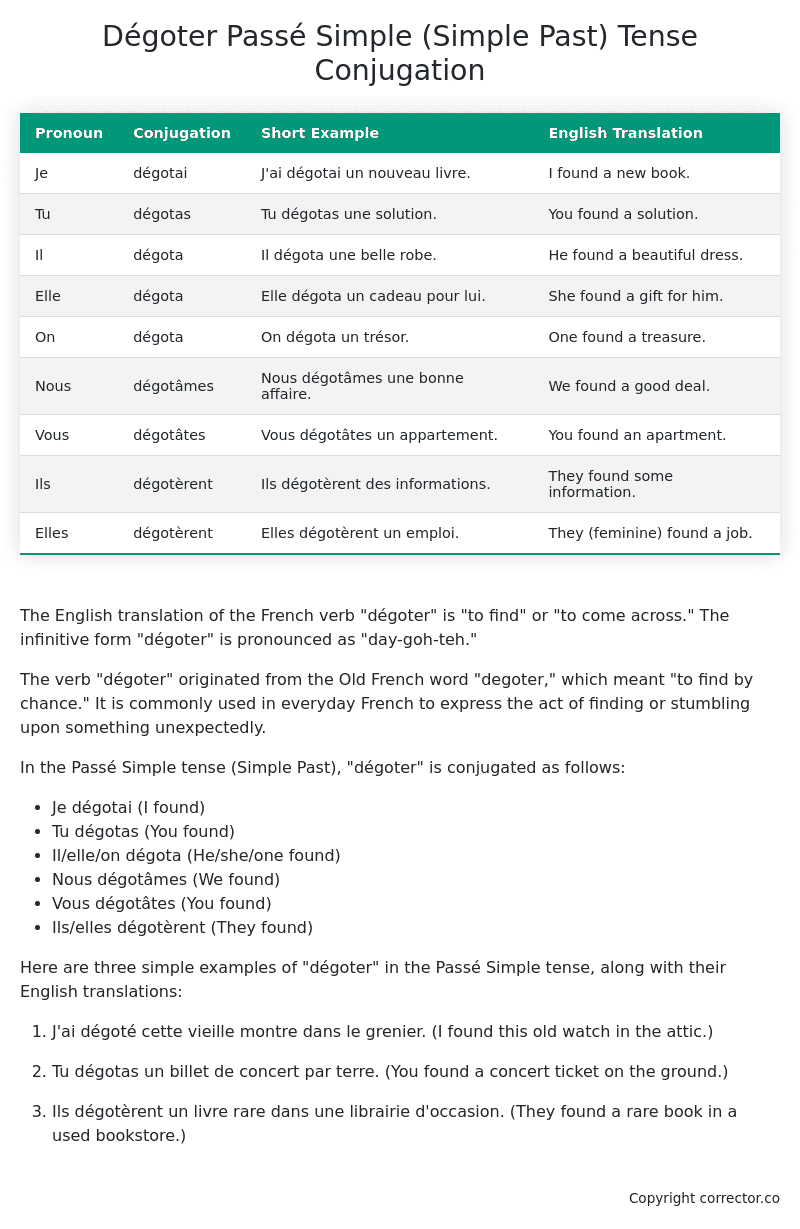Passé Simple (Simple Past) Tense Conjugation of the French Verb dégoter
Introduction to the verb dégoter
The English translation of the French verb “dégoter” is “to find” or “to come across.” The infinitive form “dégoter” is pronounced as “day-goh-teh.”
The verb “dégoter” originated from the Old French word “degoter,” which meant “to find by chance.” It is commonly used in everyday French to express the act of finding or stumbling upon something unexpectedly.
In the Passé Simple tense (Simple Past), “dégoter” is conjugated as follows:
- Je dégotai (I found)
- Tu dégotas (You found)
- Il/elle/on dégota (He/she/one found)
- Nous dégotâmes (We found)
- Vous dégotâtes (You found)
- Ils/elles dégotèrent (They found)
Here are three simple examples of “dégoter” in the Passé Simple tense, along with their English translations:
-
J’ai dégoté cette vieille montre dans le grenier.
(I found this old watch in the attic.) -
Tu dégotas un billet de concert par terre.
(You found a concert ticket on the ground.) -
Ils dégotèrent un livre rare dans une librairie d’occasion.
(They found a rare book in a used bookstore.)
Table of the Passé Simple (Simple Past) Tense Conjugation of dégoter
| Pronoun | Conjugation | Short Example | English Translation |
|---|---|---|---|
| Je | dégotai | J’ai dégotai un nouveau livre. | I found a new book. |
| Tu | dégotas | Tu dégotas une solution. | You found a solution. |
| Il | dégota | Il dégota une belle robe. | He found a beautiful dress. |
| Elle | dégota | Elle dégota un cadeau pour lui. | She found a gift for him. |
| On | dégota | On dégota un trésor. | One found a treasure. |
| Nous | dégotâmes | Nous dégotâmes une bonne affaire. | We found a good deal. |
| Vous | dégotâtes | Vous dégotâtes un appartement. | You found an apartment. |
| Ils | dégotèrent | Ils dégotèrent des informations. | They found some information. |
| Elles | dégotèrent | Elles dégotèrent un emploi. | They (feminine) found a job. |
Other Conjugations for Dégoter.
Le Present (Present Tense) Conjugation of the French Verb dégoter
Imparfait (Imperfect) Tense Conjugation of the French Verb dégoter
Passé Simple (Simple Past) Tense Conjugation of the French Verb dégoter (You’re reading it right now!)
Passé Composé (Present Perfect) Tense Conjugation of the French Verb dégoter
Futur Simple (Simple Future) Tense Conjugation of the French Verb dégoter
Futur Proche (Near Future) Tense Conjugation of the French Verb dégoter
Plus-que-parfait (Pluperfect) Tense Conjugation of the French Verb dégoter
Passé Antérieur (Past Anterior) Tense Conjugation of the French Verb dégoter
Futur Antérieur (Future Anterior) Tense Conjugation of the French Verb dégoter
Subjonctif Présent (Subjunctive Present) Tense Conjugation of the French Verb dégoter
Subjonctif Passé (Subjunctive Past) Tense Conjugation of the French Verb dégoter
Subjonctif Imparfait (Subjunctive Imperfect) Tense Conjugation of the French Verb dégoter
Subjonctif Plus-que-parfait (Subjunctive Pluperfect) Tense Conjugation of the French Verb dégoter
Conditionnel Présent (Conditional Present) Tense Conjugation of the French Verb dégoter
Conditionnel Passé (Conditional Past) Tense Conjugation of the French Verb dégoter
Conditionnel Passé II (Conditional Past II) Tense Conjugation of the French Verb dégoter
L’impératif Présent (Imperative Present) Tense Conjugation of the French Verb dégoter
L’impératif Passé (Imperative Past) Tense Conjugation of the French Verb dégoter
L’infinitif Présent (Infinitive Present) Tense Conjugation of the French Verb dégoter
L’infinitif Passé (Infinitive Past) Tense Conjugation of the French Verb dégoter
Le Participe Présent (Present Participle) Tense Conjugation of the French Verb dégoter
Le Participe Passé (Past Participle) Tense Conjugation of the French Verb dégoter
Struggling with French verbs or the language in general? Why not use our free French Grammar Checker – no registration required!
Get a FREE Download Study Sheet of this Conjugation 🔥
Simply right click the image below, click “save image” and get your free reference for the dégoter Passé Simple tense conjugation!

Dégoter – About the French Passé Simple (Simple Past) Tense
Formation
Usage
Narration
Historical Context
Interactions with other tenses
Passé Composé
Imparfait
Conditional and Subjunctive
Summary
I hope you enjoyed this article on the verb dégoter. Still in a learning mood? Check out another TOTALLY random French verb conjugation!


